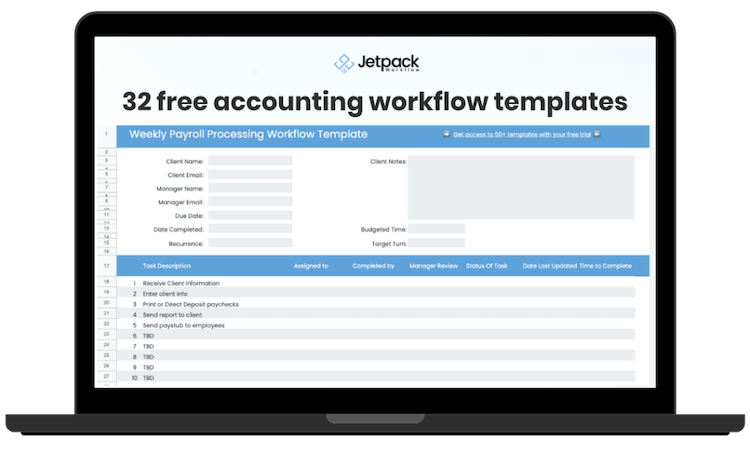Accounting Tasks Spreadsheet [Free Templates and Checklists]

Accounting firms relying on memory alone to keep up with their clients’ accounting tasks risk overlooking essential work assignments or missing critical deadlines.
It can lead to hours of overtime catching up on projects or fixing mistakes.
Rather than disappointing your clients, keep your team organized by creating detailed checklists to stay on track. A simple way to do that is with spreadsheets, using Google Sheets or Microsoft Excel.
In this article, you’ll find a free set of templates to help you get started. Plus, we review a few daily, weekly, monthly, quarterly, and annual accounting tasks successful firm owners keep tabs on to prevent their teams from getting overwhelmed.
Free Spreadsheet Templates for All Your Accounting Tasks
As your firm grows, having an organized workflow for the many client tasks you manage is vital. Without one, it’s easy to get stuck doing time-consuming work because you lack an efficient system.
There’s no need to start from scratch or use complicated accounting spreadsheets. If you’re unsure how to set up workflow checklists or have some that could use an upgrade, Jetpack Workflow’s free package of templates and checklists is for you.

Once you’ve downloaded your free templates, you can customize them with the specific client tasks you handle and never worry about missing a due date.
What are some of the tasks to add to your checklists? Let’s go over that next.
Daily Accounting Tasks
When work is piling up, it can be tempting to put off these day-to-day projects. However, these daily accounting tasks keep you organized, ensure your reporting remains accurate, and make audits much easier.
1. Reconcile Cash and Receipts
At the end of each day, reconcile all cash payments and payment receipts received in the general ledger to get a good idea of each client’s cash balance.
Daily cash reconciliations create a paper trail and work as a control for the business. You can immediately tell if cash is missing and only need to investigate the past 24 hours if anything is off. You want to avoid catching a discrepancy weeks or months later.
2. Refresh Accounting Software
Assuming you sync your accounting software with each client’s point-of-sale (POS) system and bank account, you can monitor non-cash transactions by refreshing your accounting software at the end of each day.
This task gives you real-time visibility into how much money is coming in and going out of the business, especially when combined with your cash reconciliation data. Doing this daily lets you spot any possible issues early and resolve them promptly.
Weekly Accounting Tasks
Building these weekly accounting tasks into your routine keeps you proactive with your client work as well as efficient and organized.
1. Deposit Cash and Check Payments
Most client transactions these days likely take place electronically. However, for any cash or check payments not received online, make depositing these funds a weekly habit.
Regular trips to the bank help keep your client account balances and records accurate and up to date.
2. Review Employee Timesheets
At least once a week, review employee timesheets to ensure they’re correct and get manager approval. This way, you catch any mistakes early and allow payroll to get processed on time.
This task also allows you to monitor labor costs so your clients know whether they’re within budget or need to tweak their scheduling.
Be on the lookout for unauthorized overtime pay. Employees may be entitled to it if they worked more than 40 hours, but it can result in a surprise cost for employers.
3. Review Accounts Payable
Review accounts payable at the end of the week to see if any bills are still outstanding. This weekly review helps clients avoid late fees or upsetting their vendors and suppliers.
Your clients may receive vendor invoices electronically or by mail, so be thorough to prevent missing a payment deadline.
Some bills may be on auto-pay, but you should still verify these transactions went through and that the payment method hasn’t expired.
4. Review Accounts Receivable
Similarly, confirm whether any invoices you’ve sent on behalf of your clients were left unpaid each week. Follow up if needed to collect payment and be sure you sent the invoices to the appropriate customers.
Notify your client if any invoices remain unpaid after an extended period. This way, they can take further action, such as contacting a collection agency.
Monthly Accounting Tasks
Completing the following monthly accounting tasks helps you maintain up-to-date records and avoid work piling up at the end of the quarter.
1. Reconcile Credit Card and Bank Accounts
Assuming you review accounts receivable and payable every week and all invoice payments are current, you can reconcile the client’s credit card statements and bank statements every month for accuracy.
Reconciling these accounts with month-end data gives you a real-time view of a client’s cash balance. It helps you recognize and correct any double charges, failed payments, and other discrepancies that may have gone unnoticed over the month.
2. Calculate Sales Tax
Did you know 45 states and the District of Columbia collect statewide sales tax?
If your clients operate in one of these states, you need to calculate, collect, and pay sales tax on their behalf. Should you miss a payment or send it late, you may face interest penalties or have assets seized, which can negatively affect your business credit score.
Though sales tax payments are required every quarter, making monthly calculations is a much more manageable task. At the same time, you can also estimate any county or city-level sales tax your clients must pay.
Quarterly Accounting Tasks
These are some of the quarterly accounting tasks to complete so your clients meet regulatory requirements and have an accurate year-to-date view of their finances.
1. Review Quarterly Payroll Reports and Make Payments
You should be checking employee timesheets and payroll reports every week. That’s because you need to file quarterly payroll reports with the IRS and the state where the client operates.
These reports provide information on employee wages, tax withholdings, and other payroll-related details, ensuring compliance with labor and tax laws.
If the client uses a separate payroll processing company, they complete these reports. However, you should still review them for accuracy before they get filed.
2. Pay Quarterly Income Tax Estimate
The IRS requires most small business owners to make quarterly tax estimate payments if they expect to owe more than $1,000 at year-end. That includes both federal income tax and self-employment tax, which may or may not apply to your clients.
Use year-to-date financial data to determine a client’s quarterly tax obligations. Fill out a 1040-ES and make any necessary payments to help your client avoid fines or penalties.
Depending on where your clients operate, they may also need to make quarterly state income tax payments.
Yearly Accounting Tasks
Year-end is a busy time for accountants, so here are two of the most important tasks to complete and bring the year to a close.
1. Prepare 1099s
A 1099 is a required tax filing for reporting income not subject to tax withholding. Businesses typically need to file 1099s if they paid any contractors or entities $600 or more throughout the year.
You can complete these forms once you reconcile the client’s books at the end of the year and know how much they paid out to each entity.
All 1099s must be filed with the IRS online or through the mail before January 31 to avoid penalties.
2. Prepare End-of-Year Financial Reports
One of the primary services accountants offer is the preparation of a client’s annual financial statements to display their performance over the year. Typically, this includes an income statement, balance sheet, and cash flow statement.
Financial statements are essential resources business owners rely on to assess the financial health of their operations.
It gives them a way of comparing their performance over the years. For publicly-traded companies, the SEC requires the annual reporting of financial statements.
Free Download: 32 Accounting Workflow Templates & Checklists
Keep track of all these year-round tasks and more with the 32 free Jetpack Workflow templates designed to keep your accounting practice on schedule. Download your templates here.





